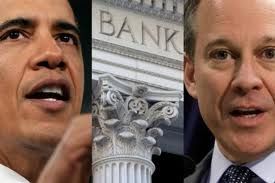Yes, that is essentially what US Attorney General Eric Holder said in a speech at Northwestern University.
Attorney General Eric H. Holder Jr. asserted on Monday that it is lawful for the government to kill American citizens if officials deem them to be operational leaders of Al Qaeda who are planning attacks on the United States and if capturing them alive is not feasible.
“Given the nature of how terrorists act and where they tend to hide, it may not always be feasible to capture a United States citizen terrorist who presents an imminent threat of violent attack,” Mr. Holder said in a speech at Northwestern University’s law school. “In that case, our government has the clear authority to defend the United States with lethal force.” […]
“Some have argued that the president is required to get permission from a federal court before taking action against a United States citizen who is a senior operational leader of Al Qaeda or associated forces,” Mr. Holder said. “This is simply not accurate. ‘Due process’ and ‘judicial process’ are not one and the same, particularly when it comes to national security. The Constitution guarantees due process, not judicial process.”
In taking apart Holder’s justification for murder, David Swanson so chillingly describes the government can kill you anywhere, anyplace, anytime they choose without evidence, charges, arrest or approval:
Attorney General Eric Holder on Monday explained why it’s legal to murder people – not to execute prisoners convicted of capital crimes, not to shoot someone in self-defense, not to fight on a battlefield in a war that is somehow legalized, but to target and kill an individual sitting on his sofa, with no charges, no arrest, no trial, no approval from a court, no approval from a legislature, no approval from we the people, and in fact no sharing of information with any institutions that are not the president.[..]
Nor can promising to imprison people without a fair trial justify murdering people. But Holder does not do that. He promises kangaroo courts:
“Much has been made of the distinction between our federal civilian courts and revised military commissions. The reality is that both incorporate fundamental due process and other protections that are essential to the effective administration of justice – and we should not deprive ourselves of any tool in our fight against al Qaeda.” [..]
Holder then explains, sensibly enough, why non-military courts work just fine (unless an extreme record of nearly 100% convictions worries you):
“Simply put, since 9/11, hundreds of individuals have been convicted of terrorism or terrorism-related offenses in Article III courts and are now serving long sentences in federal prison. Not one has ever escaped custody. No judicial district has suffered any kind of retaliatory attack.” [..]
Holder turns next to the presidential power to imprison people that was signed into law on New Year’s Eve as part of the National “Defense” Authorization Act:
“This Administration has worked in other areas as well to ensure that counterterrorism professionals have the flexibility that they need to fulfill their critical responsibilities without diverging from our laws and our values. Last week brought the most recent step, when the President issued procedures under the National Defense Authorization Act. This legislation, which Congress passed in December, mandated that a narrow category of al Qaeda terrorist suspects be placed in temporary military custody.”
This legislation did nothing of the sort. For one thing, Obama unconstitutionally altered it in a signing statement as it applied to a huge prison full of largely non-al Qaeda prisoners in Afghanistan. In addition, there has been quite a bit of discussion of the power this bill creates to imprison U.S. citizens. [..]
And, despite tremendous, often willful, confusion, the history is clear that Obama insisted on the power to imprison U.S. citizens and to do so outside of the military.
This is madness. The Constitution does not permit any of this. Holder quoted no legal standards. As the New York Times reported in its article on Holder’s speech, “the speech had contained no footnotes or specific legal citations”:
{..} and it fell far short of the level of detail contained in the Office of Legal Counsel memo – or in an account of its contents published in October by The New York Times based on descriptions by people who had read it.
The administration has declined to confirm that the memo exists, and late last year, The Times filed a lawsuit under the Freedom of Information Act asking a judge to order the Justice Department to make it public. In February, the American Civil Liberties Union filed a broader lawsuit, seeking both the memo and the evidence against Mr. Awlaki.
And where are the Democrats and so-called “progressives”? As Glenn Greenwald at Salon writes, “Yet, with some righteous exceptions, the silence is deafening, or worse“:
How can anyone who vocally decried Bush’s mere eavesdropping and detention powers without judicial review possibly justify Obama’s executions without judicial review? How can the former (far more mild powers) have been such an assault on Everything We Stand For while the latter is a tolerable and acceptable assertion of war powers? If Barack Obama has the right to order accused Terrorists executed by the CIA because We’re At War, then surely George Bush had the right to order accused Terrorists eavesdropped on and detained on the same ground. [..]
To recap Barack Obama’s view: it is a form of “terror” for someone to be detained “without even getting one chance to prove their innocence,” but it is good and noble for them to be executed under the same circumstances. To recap Eric Holder’s view: we must not accept when the Bush administration says “just trust us” when it comes to spying on the communications of accused Terrorists, but we must accept when the Obama administration says “just trust us” when it comes to targeting our fellow citizens for execution. As it turns out, it’s not 9/11/01 that Changed Everything. It’s 1/20/09. [..]
Find a defender of Obama’s assassination program and all you’ll hear is exactly the same thing: this is only being directed at The Terrorists like Awlaki, so we don’t need any court review or due process. Here was Holder yesterday: “it is imperative for the government to counter threats posed by senior operational leaders of al Qaeda, and to protect the innocent people whose lives could be lost in their attacks,” and assassination orders are only issued once “the U.S. government has determined, after a thorough and careful review, that the individual poses an imminent threat of violent attack against the United States.” [..]
He (Holder) said, for instance, that “the Supreme Court has made clear that the Due Process Clause does not impose one-size-fits-all requirements, but instead mandates procedural safeguards that depend on specific circumstances.” That part is true: in the 2004 case of Hamdi v. Rumsfeld, the Supreme Court rejected the Bush administration’s argument that it could detain American citizens accused of Terrorism without any process for them to contest the accusations against them, though the Court held that something less than a full-scale trial could satisfy the Due Process clause. But as Marcy Wheeler points out, the Court imposed “due process” requirements that are the exact opposite of what the Obama administration is doing with its assassinations.
The very idea that presidential assassination powers will become accepted policy for every future president, that the core of the Constitutional protection of due process can be based solely on the word of the president and made in total secrecy without the opportunity to view, or even refute, any evidence is abhorrent and evil.
These articles with their extensive citations by credible authors are must reads:
Attorney General Holder Says Murder Is Legal
by David Swanson, anti-war activist and author of Day Break and War Is A Lie, who runs the websites DavidSwanson.org and WarIsACrime.org (formerly AfterDowningStreet.org)
Attorney General Holder defends execution without charges
by Glenn Greenwald, best selling author, former Constitutional and civil rights litigator and contributing writer at Salon
Eric Holder’s View on National Security: Three Branches. Except for When the Third becomes Inconvenient.
by Marcy Wheeler, author and runs website emptywheel
When the US Government Can Kill You, Explained
by Adam Serwer, writer for Mother Jones
Time to Play “What if Alberto Gonzalez Said That?”
by John Cole, blogger and runs website Balloon Juice
How We Can Help President Obama Today
by Charles P. Pierce, contributing write at Esquire
Assassinating U.S. Citizens: Holder says “Yes We Can”
by Jesselyn Radack, director of National Security & Human Rights at the Government Accountability Project.

 Just when you thought that the Obama administration’s assault on the Internet and his plan to censor free speech and creativity couldn’t be worse, Obama gets more creative. Meet the “son of the Anti-Counterfeiting Trade Agreement (ACTA)”, the
Just when you thought that the Obama administration’s assault on the Internet and his plan to censor free speech and creativity couldn’t be worse, Obama gets more creative. Meet the “son of the Anti-Counterfeiting Trade Agreement (ACTA)”, the  I realize that there has been a lot of speculation about what went down in the 24 hrs prior to the SOTU after Miller announced that there was no bank/state settlement deal. There is a lot of speculation about Schneiderman and not without good reason. When I was writing
I realize that there has been a lot of speculation about what went down in the 24 hrs prior to the SOTU after Miller announced that there was no bank/state settlement deal. There is a lot of speculation about Schneiderman and not without good reason. When I was writing 

Recent Comments